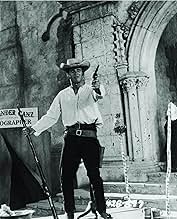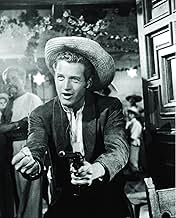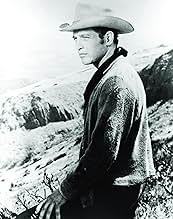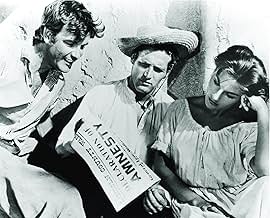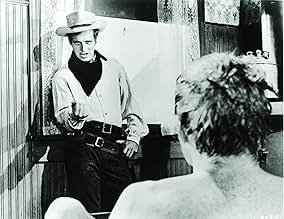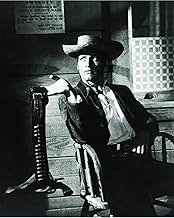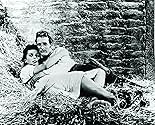IMDb RATING
6.4/10
4.9K
YOUR RATING
After his employer is murdered by rival cattlemen, a troubled and uneducated young cowboy vows revenge on the murderers.After his employer is murdered by rival cattlemen, a troubled and uneducated young cowboy vows revenge on the murderers.After his employer is murdered by rival cattlemen, a troubled and uneducated young cowboy vows revenge on the murderers.
- Awards
- 1 win total
Robert Anderson
- Hill
- (as Bob Anderson)
Josephine Parra
- Bride
- (as Jo Summers)
- Director
- Writers
- All cast & crew
- Production, box office & more at IMDbPro
Featured reviews
There have been forty-six feature films made about the life of Henry McCarty, alias William H. Bonner, alias Billy the Kid. All movies mix fact and fiction to a greater or lesser degree but one of the few sympathetic portraits of the young outlaw is Arthur Penn's 1958 film The Left-Handed Gun starring Paul Newman. Newman's Billy is a confused, emotionally unstable personality rather than a cold-blooded killer, and Penn would have us believe that Billy killed because he was forced to defend himself and his honor, not just for the thrill of it. Based on the teleplay, "The Death of Billy the Kid" by Gore Vidal, The Left-Handed Gun is a very entertaining film but feels more like a star vehicle for Newman than a film that strives to be challenging or complex. Newman captures Billy's humor and sense of fun but is too old (33) for the role and his cynical swagger seems inappropriate for the slow-witted teenager.
Billy the Kid grew up among settlers of the new towns in the American Southwest made up of cattle thieves, gamblers, and murderers. He was an illiterate drifter until John Tunstall (Keith Johnston), a friendly English rancher, took him under his wing and became a father figure. In the film, Billy becomes devoted to Tunstall (in reality Tunstall was only 24) and when the rancher is killed by a deputy and three others sent to take Tunstall's cattle and property because of his partnership with McSween in the mercantile business in Lincoln, Billy vows revenge. Together with his buddies, Tom Folliard (James Best) and Charlie Boudre (James Congdon), they track down the killers one by one until Billy is arrested and jailed by lawman Pat Garrett (John Dehner) after the last of the foursome is murdered on Garrett's wedding night. When Billy escapes from jail, killing his guards in the process, Garrett tracks him to the Chihuahuan Desert where the story of Billy the Kid's life ends and the myth begins.
Billy the Kid grew up among settlers of the new towns in the American Southwest made up of cattle thieves, gamblers, and murderers. He was an illiterate drifter until John Tunstall (Keith Johnston), a friendly English rancher, took him under his wing and became a father figure. In the film, Billy becomes devoted to Tunstall (in reality Tunstall was only 24) and when the rancher is killed by a deputy and three others sent to take Tunstall's cattle and property because of his partnership with McSween in the mercantile business in Lincoln, Billy vows revenge. Together with his buddies, Tom Folliard (James Best) and Charlie Boudre (James Congdon), they track down the killers one by one until Billy is arrested and jailed by lawman Pat Garrett (John Dehner) after the last of the foursome is murdered on Garrett's wedding night. When Billy escapes from jail, killing his guards in the process, Garrett tracks him to the Chihuahuan Desert where the story of Billy the Kid's life ends and the myth begins.
I wonder what the mature Paul Newman thought of this early movie performance. Of course, 'mature' is a relative term since he's already 33 here, well beyond the 'kid' range. In my little book, it's the most mannered and misdirected acting of his long and distinguished career. It's almost like he's working at an excess of James Dean. That wouldn't be surprising since the screenplay's Billy comes across as more misunderstood youth than cold-blooded killer. I guess this is the first of director Penn's efforts at rehabilitating notorious American outlaws, leading up to the glossy Bonnie and Clyde (1967).
The movie itself is pretty good, the open range locations even looking like eastern New Mexico, while Penn uses them to good effect. But it's really James Best as the ill-fated henchman Tom who steals the film. His supporting role manages a certain poignancy that should have come from Billy, but doesn't. With the right breaks, I think Best could have carved a real niche in films. Speaking of supporting players, with the exception of the cartoonish Moultrie (Hatfield), they appear recruited from the many TV Westerns of the day, especially the familiar Denver Pyle and the classy John Dehner.
Penn establishes himself here as a moviemaker to watch with a number of nice touches— having Pyle squint into the sun just before the fateful moment, the lone boot left standing in the road, and others. I'm kind of sorry that the baby-faced Audie Murphy didn't get a shot at Billy's role. Visually, he's perfect. Plus, surprisingly for that boyish appearance, he could do a killer-stare to make you believe he killed 100 Germans during the war. Also, Murphy could have made that key facedown scene with Joe Bell (Pryor) as genuinely chilling as it should be. For whatever the charming Newman's considerable skills, being downright mean is not one of them. Anyway the movie remains an interesting entry on the road to 1960's-style rebellious movie-making.
The movie itself is pretty good, the open range locations even looking like eastern New Mexico, while Penn uses them to good effect. But it's really James Best as the ill-fated henchman Tom who steals the film. His supporting role manages a certain poignancy that should have come from Billy, but doesn't. With the right breaks, I think Best could have carved a real niche in films. Speaking of supporting players, with the exception of the cartoonish Moultrie (Hatfield), they appear recruited from the many TV Westerns of the day, especially the familiar Denver Pyle and the classy John Dehner.
Penn establishes himself here as a moviemaker to watch with a number of nice touches— having Pyle squint into the sun just before the fateful moment, the lone boot left standing in the road, and others. I'm kind of sorry that the baby-faced Audie Murphy didn't get a shot at Billy's role. Visually, he's perfect. Plus, surprisingly for that boyish appearance, he could do a killer-stare to make you believe he killed 100 Germans during the war. Also, Murphy could have made that key facedown scene with Joe Bell (Pryor) as genuinely chilling as it should be. For whatever the charming Newman's considerable skills, being downright mean is not one of them. Anyway the movie remains an interesting entry on the road to 1960's-style rebellious movie-making.
This Film has Many Interesting Elements that may Attract Viewers. Director Arthur Penn's Debut, Early Paul Newman as an Iconic Western Outlaw, and a Different Artistic Approach to the Conventional Western.
However, the Movie is not the Easiest to Like. Penn's Flourishes are Welcome in a Genre so Ripe with Regularity, but Newman Overacts to the Point of Silliness and can Grate on the Nerves.
In Fact, just about Every Actor Emotes to Extreme, Except Perhaps John Dehner as Pat Garrett who Strikes a Concerned Lawman's Pose Quite Well Without Words. But even He is Guilty of One Scene that is Downright Atrocious (the this is my wedding, this is my town part).
Visually the Film has Many Interesting Shots and Flourishes, but Newman's Exaggeration of Body Language and Other Fanciful Displays that Misfire bring the Movie Down to just Above Average. There is Enough Curiosity here that is Worth a Watch, but Overall it is the Over Baked Acting that makes this a Disappointment.
However, the Movie is not the Easiest to Like. Penn's Flourishes are Welcome in a Genre so Ripe with Regularity, but Newman Overacts to the Point of Silliness and can Grate on the Nerves.
In Fact, just about Every Actor Emotes to Extreme, Except Perhaps John Dehner as Pat Garrett who Strikes a Concerned Lawman's Pose Quite Well Without Words. But even He is Guilty of One Scene that is Downright Atrocious (the this is my wedding, this is my town part).
Visually the Film has Many Interesting Shots and Flourishes, but Newman's Exaggeration of Body Language and Other Fanciful Displays that Misfire bring the Movie Down to just Above Average. There is Enough Curiosity here that is Worth a Watch, but Overall it is the Over Baked Acting that makes this a Disappointment.
The director of Bonnie & Clyde and Little Big Man is off to a promising start with The Left Handed Gun, his first film. The film stars a young Paul Newman as Billy the Kid. Billy, working as a ranch hand, swears revenge on the four men who ambushed and killed his boss.
That's about it for plot. Newman plays Billy well, portraying a man bent on his mission. One senses that he means well, but his short temper and dark past always get the best of him, even during his friend's, Pat Garrett (John Dehner in a nice performance), wedding.
Unfortunately, Newman suffers from a weak supporting cast and little character development. I found it hard to believe that Billy could develop such a strong bond with his boss in such a short time (although the movie doesn't exactly specify how long). With the possible exception of Garrett, the remaining players are there to fill up the screen.
In short, I wasn't disappointed with this film, but if you want to view a great Western about a man driven by revenge, definitely see John Wayne in The Searchers.
That's about it for plot. Newman plays Billy well, portraying a man bent on his mission. One senses that he means well, but his short temper and dark past always get the best of him, even during his friend's, Pat Garrett (John Dehner in a nice performance), wedding.
Unfortunately, Newman suffers from a weak supporting cast and little character development. I found it hard to believe that Billy could develop such a strong bond with his boss in such a short time (although the movie doesn't exactly specify how long). With the possible exception of Garrett, the remaining players are there to fill up the screen.
In short, I wasn't disappointed with this film, but if you want to view a great Western about a man driven by revenge, definitely see John Wayne in The Searchers.
One of the strangest westerns ever made. Arthur Penn's "The Left Handed Gun", adapted from a play by Gore Vidal, came right at the height of the 'teenage rebel' cycle of the fifties with Paul Newman's Billy the Kid having more in common with James Dean's Jim Stark than any Western outlaw I can think of. The film wasn't a success; it's highfalutin dialogue and over-the-top acting proving too much for a general audience who, if they looked just below the surface, would have easily detected a homosexual subplot involving Hurd Hatfield's character who acts as a kind of Greek Chorus. It marked the screen debut of Penn who didn't make another film for four years though it's now built up something of a cult reputation. It isn't really very good, and it is very self-concious, but it is also too bizarre to dismiss out of hand.
Did you know
- TriviaThe film originally was to have been made in 1956 with James Dean in the lead role.
- GoofsThe film is about western outlaw Billy the Kid, who was actually right-handed.
- ConnectionsFeatured in Legends of the West (1992)
- SoundtracksBallad of The Left Handed Gun
Written by William Goyen and Alexander Courage
[Movie theme ballad played over the opening title card and credits]
- How long is The Left Handed Gun?Powered by Alexa
Details
- Release date
- Country of origin
- Languages
- Also known as
- The Left Handed Gun
- Filming locations
- Production companies
- See more company credits at IMDbPro
Box office
- Budget
- $700,000 (estimated)
- Gross worldwide
- $5,066
- Runtime
- 1h 42m(102 min)
- Color
- Aspect ratio
- 1.85 : 1
Contribute to this page
Suggest an edit or add missing content


